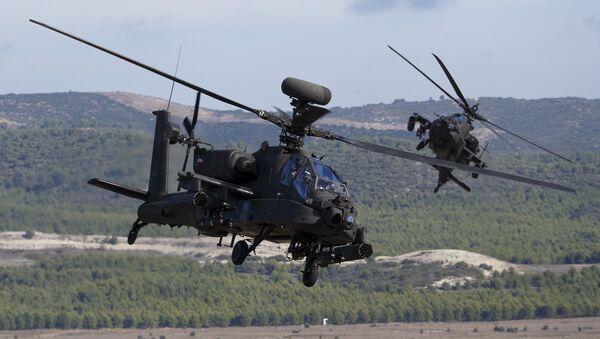The batch of upgraded Apache helicopters arrived in Germany this week, as the 1st Air Cavalry Brigade (1ACB) of the US Army's 1st Cavalry Division out of Fort Hood, Texas, begins its nine-month rotational mission in Europe, Stars and Stripes reported.
The rotational mission, called "Operation Atlantic Resolve," is the US-led military initiative aimed at deterring "resurgent Russia in Eastern Europe."
The 1st Cavalry was preceded by 10th Combat Aviation Brigade (CAB) with the Army's 10th Mountain Division out of Fort Drum, New York, which trained servicemen from about 20 countries, the report says. The brigade is now going home.
"This has been a fantastic experience for us, and I think [1ACB is] going to do very well out here," said 10th CAB commanding officer Colonel Clair Gill.
"Air cavalry troopers bring flexibility and lethality to the mission," said commanding officer Col. Cain Baker. "The [brigade] will deter aggression and provide strength to our friends and allies in Europe."
Most 1ACB soldiers and helicopters will be based at headquarters in Illesheim, Germany, but smaller detachments will go to other NATO allies like Latvia, Poland and Romania, Stripes reported at the time.
The US defense media outlet notes that US and NATO forces are having trouble. NATO forces' mobility problems are well-known, and 1ACB and the 10th CAB are no exceptions. Narrow bridges might not be such big problems for choppers as for tanks, but national borders present more of an obstacle.
"Every country we work with is a sovereign nation, with their own laws, and we respect that," Gill said. "What we would like to do is be able to go from one country to the other, without all of the paperwork of crossing borders, like the Schengen Agreement."
It is not only problematic to move the choppers to Eastern Europe; arguably the bigger problem is keeping them supplied with fuel, spare parts and supplies.
"Without fuel, supplies and parts, we're only good for about one flight," Gill said.
"While we haven't completely solved all our problems, we've addressed a lot of the problems, and I think we've made it easier for those coming in after us," he concluded optimistically as his brigade is packing things to go back home.



